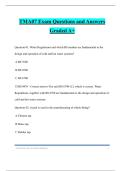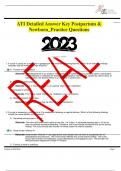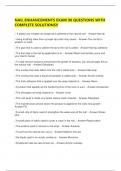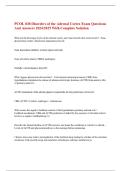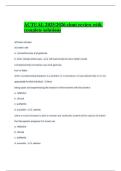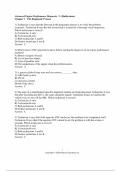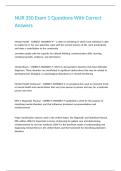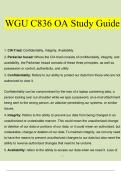Week 1 - history and functioning of tort law
Week 2 - structure of national systems, protection of interests
Week 3 - liability based on “wrongs”; the requirement of “fault”
Week 4 - damage, damages, & loss of a chance
Week 5 - factual causation; multiple causes
Week 6 - “legal causation”; contributory negligence
,Week 1 A short history of tort law: Roman Law
Tort law = Extra-contractual relationship: liable for a wrong that is not based on a contractual relationship → non-contractual liability
Christian von Bar
- Law of delict describes the field of PL which determines whether a person who has sustained damage has a right to
compensation
- Function: compensation of damage
- No prior relationship between victim and tortfeasor
- Law of delict is part of law of obligations
- In every legal system of the EU cases in which a party is found to have non-contractual responsibility for damage caused to
another party can be divided into liability with and liability without personal misconduct on the part of the person sued.
-
● Compensation - Aiming to compensate the victim - focus on the victim - in a specific Circumstance for the harm they suffered
● Sometimes prevention - Focus shifts on the defendant/tortfeasor
● Everyday frequent torts - traffic
1. Continental Europe
Tort system with punitive elements - Roman system
● The Romans distinguished 3 sources of obligations:
○ 1) ex contractu (contracts)
○ 2) ex delicto and (delicts)
○ 3) ex variis causarum figuris (quasi-contract & quasi-delict (as if it is))
● Gaius’s Institutes (2nd century A.D.); G. III, 182 → differentiated delict from contract (law of obligation is described)
,○ Let us pass now to those obligations that originate in delict, as when theft has been committed, robbery, wrongful
damage to property or [personal] injury. The obligation in all of these is of the same sort; whereas, as we have seen,
contractual obligations are of four sorts.
■ Four categories of Roman delicts/the structure of national systems under Roman law:
● ⇢ furtum = theft
● ⇢ rapina = robbery (theft with violence)
● ⇢ Damnum iniuria datum = wrongful damage to property (Justinian’s digest)
● ⇢ Iniuria = personal injury (defamation, slander)
■ Punitive elements: → Roman Law had a penal character
● ⇢ actio furti: 2x or 4x the value of the stolen item (+condictio)
● ⇢ actio vi bonorum raptorum: 4x value of robbed item
● ⇢ actio legis Aquiliae: highest value in nearest year/30 days
● ⇢ actio iniuriarum: max. penalty set by praetor
● ⇢ all except Lex Aquilia: “infamia”
● ⇢ all, in case of denial: conviction in duplum
→ each category had a punitive element: it is not just about compensation, it’s about punishing the wrongdoing
○ Characteristics of Roman delictual actions:
■ In the time of the Glossators and the Commentators, Roman law continued to be applied in its traditional form:
focus on actions, penal character and passive intransmissibility
■ Actions had punitive elements as opposed to a contractual claim
■ “Actio poenalis moritur cum persona” (dt.: Die Strafhandlung erlischt mit der Person) (not passively
transmissible)
■ In cases of multiple wrongdoers, each is liable in full
■ This clearly distinguished delictual actions from contractual actions. In Gaius’s system, there is no place for an
Allgemeiner Teil on Schuldverhältnisse
■ delicts nowadays are not much different from contracts, they all hold very similar obligations!
↓↓↓↓↓↓↓↓↓↓ the aim of tort law shifted from having a penal character to compensation ↓↓↓↓↓↓↓↓↓↓
, Tort system with focus on compensation - natural law school
● A fundamental change: the natural law school in continental Europe (16th and 17th C) as opposed to the Roman system
○ Idea of the natural law school:
■ departed from the traditional divisions of Roman Law
■ → overriding principles derived from “nature”
■ the essence of the obligations ex delicto was the “natural” principle that someone who was at fault had a
responsibility to make good the loss
○ Hugo de Groot (“Grotius”), 1583-1645 De Iure Belli ac Pacis:
■ “Let us now come to what is naturally due in consequence of a wrong. By a wrong we here mean every fault,
whether of commission or omission, which is in conflict with what men ought to do, either generally or by
reason of a special quality. From such a fault, if damage has been caused, an obligation arises naturally,
namely, that it should be made good.”
○ Push for codifications → harmonisation of new tort idea (reason for why the compensation objective is prevalent in
continental Europe)
■ Civil Codes were heavily influenced by the ideas of the natural law school
● The Prussian Allgemeines Landrecht (1794)
● the French Code Civil (1804)
● the Austrian Allgemeines Bürgerliches Gesetzbuch (1811)
■ Many subsequent codifications (e.g. Swiss, Japanese, Italian, Spanish, Belgian and Dutch) were at least
partially inspired on these models
○ Result of Codifications & natural law school
■ Result: European continental systems view “tort” as one reason for the imposition of an obligation (on a par
with contract, unjust enrichment)
■ Public Law = punishes
■ Tort law = compensatory → relationships between private individuals = no punishment
○ change: we see every Western system moving from punitive elements to a system which in a private law context is
more about restitution and compensation and punishment is in the hands of an independent state authority
■ Private law is about compensation, Public law about punishment


